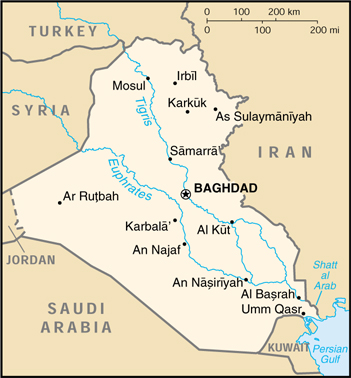

Status Quo Side: Iran
Non-Status Quo Side: Iraq
Region: Middle East
Conflict Type: Interstate
Issues in Dispute: Ethnic, Strategic, Territory
Strained Arab-Persian relations date from the Arab defeat of the Persians in Quadisiya in 637. The historic boundary along the Shatt-al-Arab waterway between Ottoman and Persian empires was established by the Ezerum treaty of 1847, and revised in 1914 and 1937 to give Iran right of passage. Iran declared the border treaty void in 1969 after Iraq presssed claims to the entire Shatt-al-Arab. Algeria helped negotiate a new treaty in 1975 fixing the boundary but tension continued. The Iranian Islamic Revolution in 1979 energized support for Shi'ite fundamentalists in Sunni majority-controlled Iraq. Rebellion against Persian rule had occurred in Iranian Khuzestan in 1924 and 1943, and the province had petitioned for incorporation into Iraq in 1946 and 1947 as "Arabistan."
Iraqi President Saddam Hussein vowed to regain "Iraqi" territory after an assassination attempt on Iraqi vice-premier Tariq Aziz. Minor border clashes and Iran's support for Kurdish rebels in Iraq increased tensions. World disfavor of Iran's Ayatollah Ruhollah Khomeni, his regime's apparent instability, and loss of US military supplies made the timing appear favorable.
Reported Iranian border attacks preceded Iraq's invasion of oil-rich Khuzestan. Initial Iraqi successes were offset by an Iranian push into Iraq, aided by Israeli arms and human wave assaults. Iraq held firm with discreet Arab, US, and Soviet support, and with UN-confirmed use of chemical weapons. Iran ignored peace initiatives by Iraq, the UN, Arab League, PLO, and others, insisting on UN condemnation of the aggression and Hussein's replacement.
The UNSC's resolution 598 of July 20, backed by superpower diplomacy, called for an end to the war. Iran remained intransigeant until military losses, plus US naval pressures in the Gulf made defeat inevitable. The UNSYG announced a cease-fire on August 8 to be monitored by a UN force, which the UNSC voted to create on August 9, to be followed by direct talks under UN auspices. Iraq balked at the proposed UN timetable unless Iran agreed to reopen the Shatt-al-Arab, blocked during the war.
In the wake of Iraq's invasion of Kuwait in August, Saddam Hussein accepted all basic Iranian terms for settlement, including prisoner exchange and restoration of the mid-channel boundary in the Shatt-al-Arab.